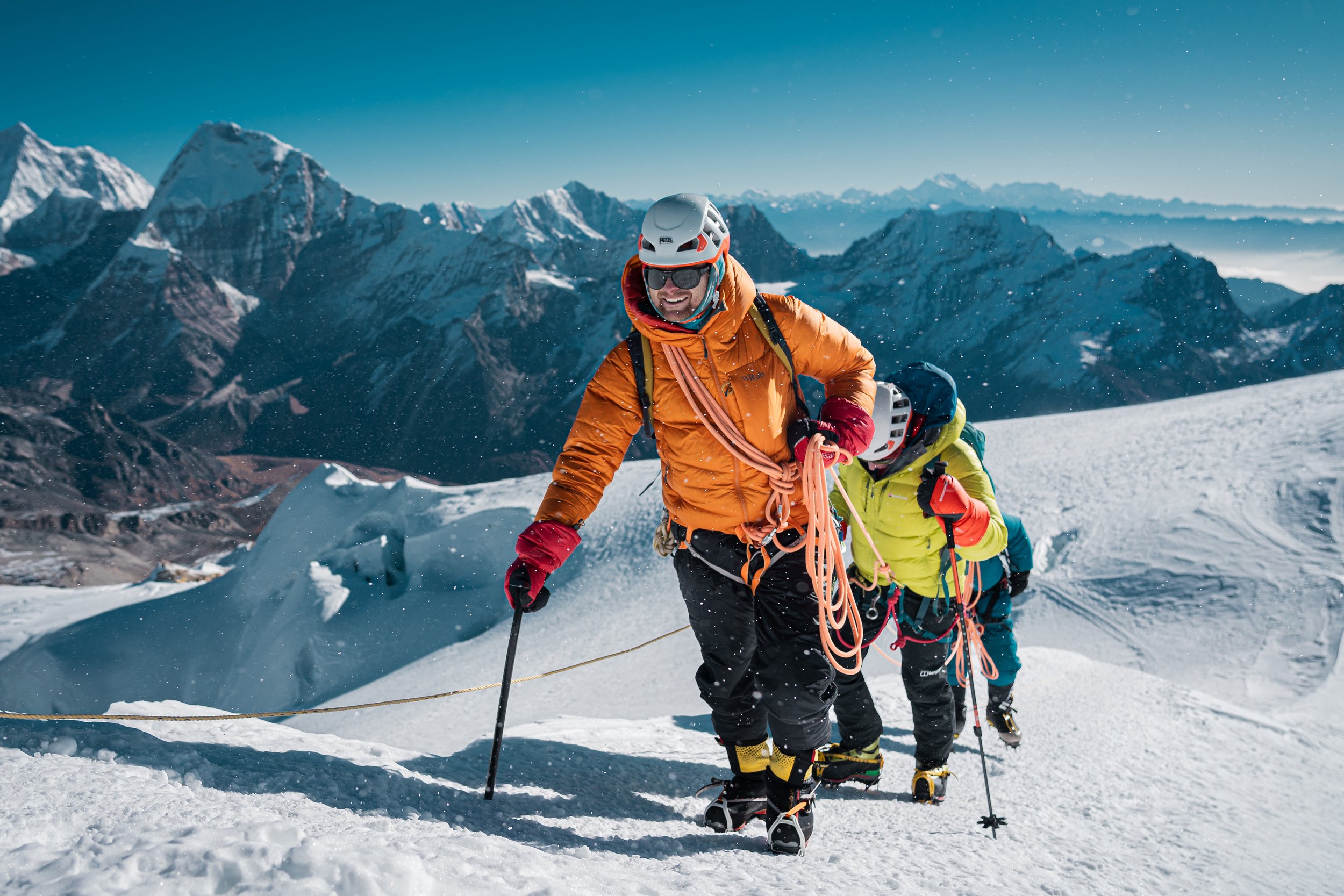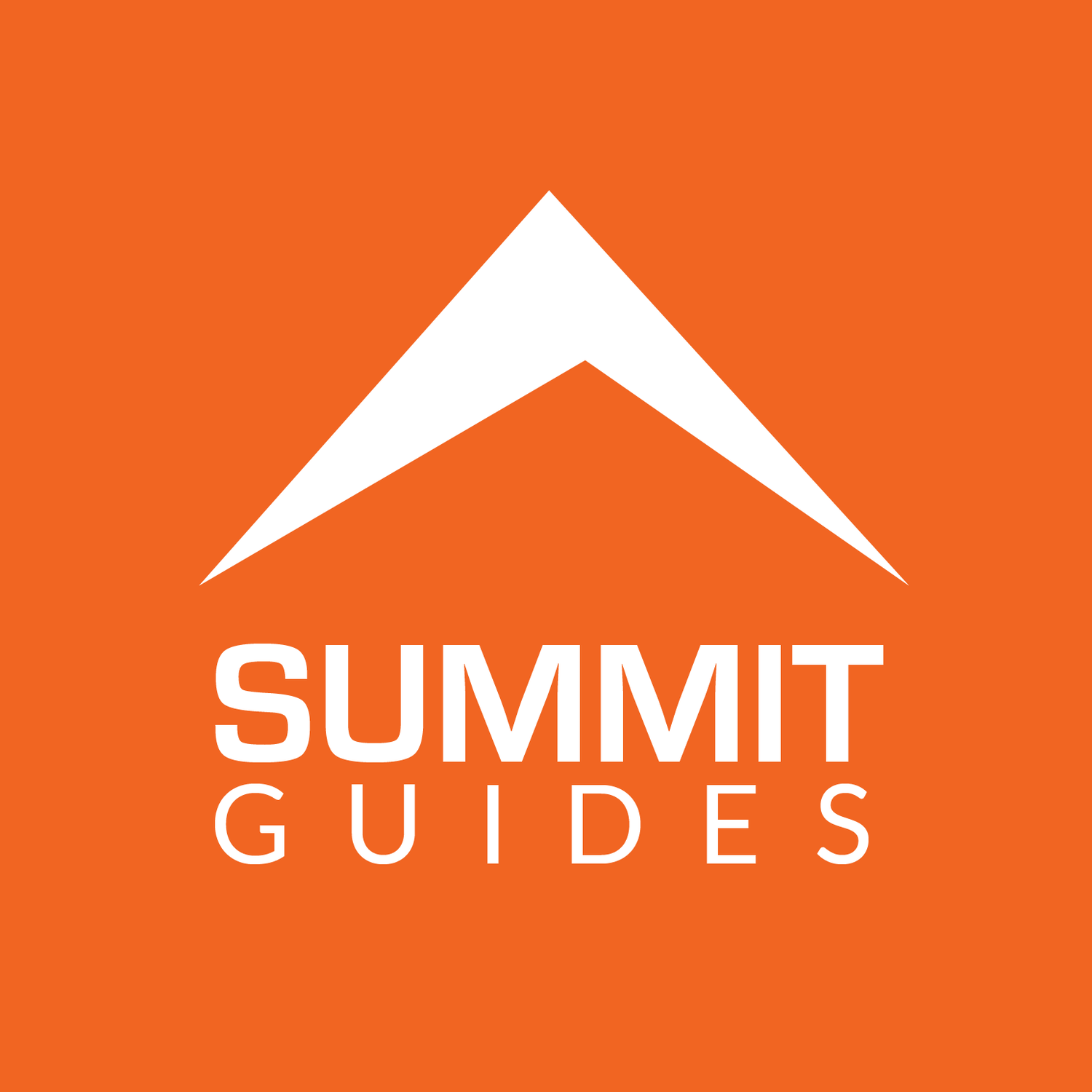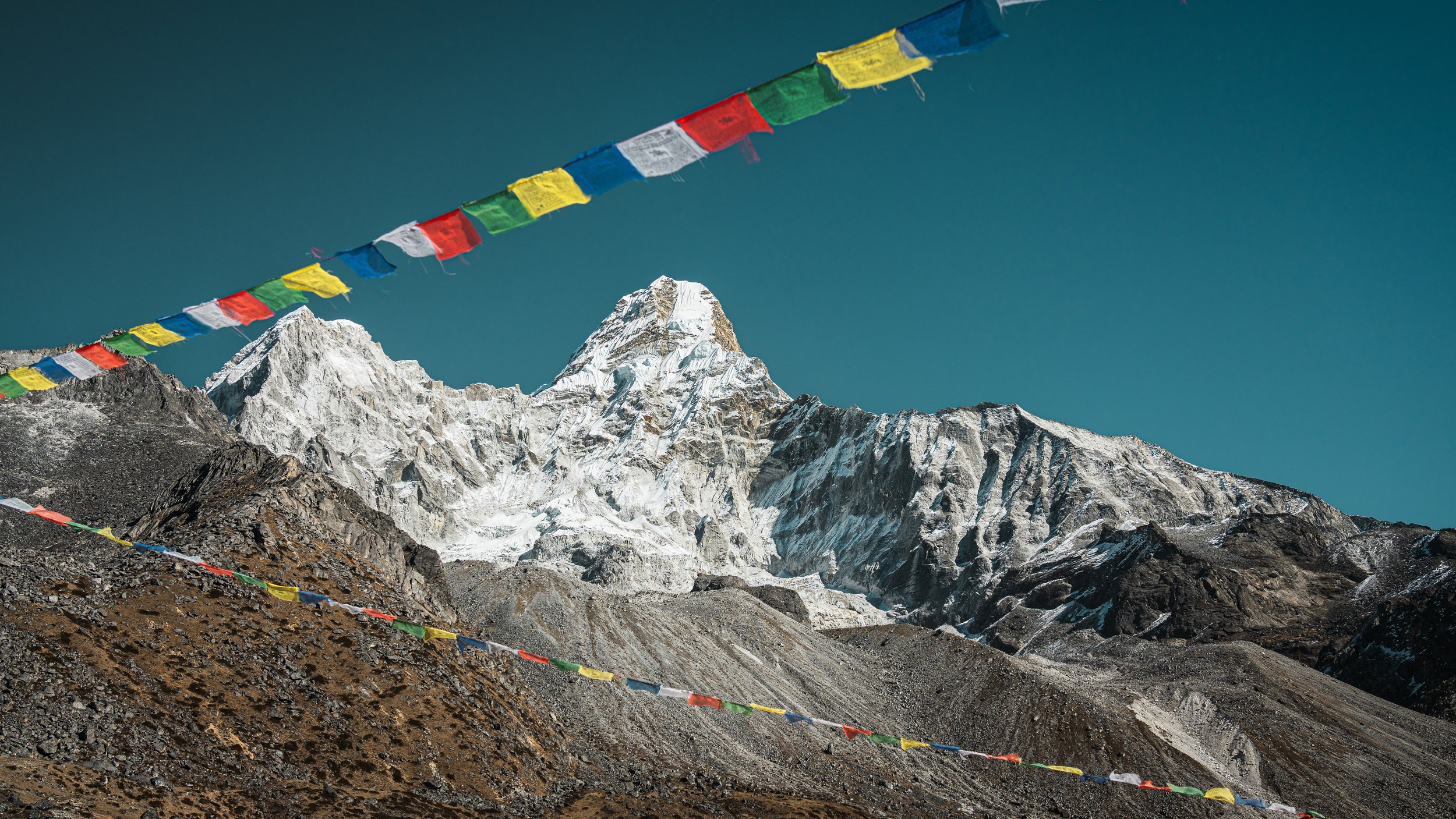
NEPAL 6000m PEAKS
Climb three Himalayan giants - Mera Peak (6476m), Island Peak (6189m) & Lobuche (6119m) in a demanding mountaineering odyssey through the Himalaya.
This will be a real adventure – 2-3 world-class high-altitude objectives one after the other with Everest as the backdrop!
6000m peak bagging in a demanding month-long package, the Nepalese mountains of Mera Peak (6476m) and Island Peak (6189m) provide a superb introduction to high altitude in the Himalaya. If weather, logistics and fitness allow, we have ample time in the schedule for Lobuche (6119m) as well. Is this the best high altitude mountaineering trek in the world?
The route passes over the mighty Amphu Labtsa Pass - read our Guide to the Amphu Labtsa.
DURATION
HIGHEST ALTITUDE
31 Days
6476m
GROUP SIZE
DIFFICULTY LEVEL
2-4 participants
2C
DATES Spring or Autumn
COST £6795
Experience required: Previous altitude expedition & winter mountaineering experience using ice axe and crampons is essential, with a good standard of fitness capable of sustained effort over 4 weeks.
An Expedition Training Weekend may be appropriate for many participants.
Experienced western leader and local Sherpas on the mountain, and Base Camp support on each peak.
Small group size.
An exquisite, unique itinerary taking in the breathtaking Hinku Valley up to Mera, the remote Amphu-Laptsa pass over to Island Peak and descending the world famous Khumbu Valley.
Crampons/ice axe, ropes and jumaring on fixed lines required for the summit days.
Local Guide: Pemba Nuru Sherpa
Nationality: Nepalese
Occupation: High Altitude Guide (full time)
Languages: Sherpa, Nepalese, English
Expert in: High altitude guiding including multiple 8000m such as Everest, K2, Kanchenjunga, Cho-Oyu & Manaslu
Known for: Member of elite summit fixing team on Everest x 6 seasons and well respected mountaineer with seemingly limitless energy and enthusiasm!
Whats included on a Nepal 6000m Peaks Expedition with Summit Guides
• Guiding services provided by Tom Lawfield and local Sherpa team
• Bespoke, and (where practical) a flexible itinerary
• A longer acclimatisation programme than many other operators
• Includes all breakfasts in the hotel, and snacks/meals on trek (but not bottled or alcoholic drinks)
• 3 nights 3* accommodation in Kathmandu
• Teahouse accommodation and tents (on a sharing basis although we will spread out in different rooms where this option is available)
• All peak Permits and administration
• Sherpa and porter support
• Cook, kitchen staff, kitchen equipment & dining tent
• All transfers to and from Kathmandu airport
• All in-country transfers, including Lukla/Ramechapp - Kathmandu return flights on fixed wing flight
Included
Excluded
• Travel to/from the airport in the UK
• Air travel UK-Kathmandu return
• Celebration dinner and any lunch/dinners in Kathmandu
• Costs associated with a non-scheduled descent from the mountain for whatever reason (eg. transport, accommodation, food etc)
• Additional hotel nights in Kathmandu (beyond the 3 included nights)
• Incidental costs - eg. showers in Teahouses, Wi-Fi, bottled & alcoholic drinks
• Travel insurance
• Personal kit
• Tips for local staff: $600USD per participant recommended (£ sterling and € euros are also fine)
Other information
-
Flights to and from Nepal are NOT included. You will need to make your own way to and from Tribhuvan International Airport, Nepal (KTM). Qatar Airways are generally the best choice as they have flexible flight changes and flights are available from multiple UK cities (London and Manchester). Nearer the time we will communicate so we are on the same flight, either meeting at the airport in the UK or potentially Doha en route. 25-30kg of hold baggage + 7kg cabin baggage is generally adequate for this trip.
Internal flights from Kathmandu/Ramechhap to Lukla are included in the cost of the trip, with 15kg baggage allowance (10kg in the hold, 5kg cabin baggage). In the event we are over the weight limit, excess bags are sometimes put onto a later flight and will join us later in the trip – normally this will be the heavy high altitude jackets, ice axes, crampons etc which we don’t need immediately.
The flight from Kathmandu (or Ramechhap) to Lukla is weather dependent, and frequently flights are delayed by a day or two (any cloud at Lukla airport means the planes will not land there for safety reasons). A good attitude to have is to assume there will be 1-2 days of delays to the Lukla flight – and if we fly in earlier it’s a bonus! The trip itinerary is generous enough to allow for a few days of delays at either end of the trip, and there is also a ‘short cut’ option early on in the trek to go over the alternative but challenging Zatra La (4630m) – which shaves two days off the itinerary. A helicopter to Lukla is also a viable but costly back up option – at additional expense (approximately $2000-$3000 shared between the clients).
-
• 3 star hotel accommodation – we stay at Aloft Marriott Hotel www.marriott.com/en-gb/hotels/travel/ktmal-aloft-kathmandu-thamel/ This is on the edge of the tourist hotspot Thamel District, so ideal for local coffee shops, bars and picking up outdoor kit. Don’t forget your swimming trunks for the steam room/sauna/jacuzzi and pool!
• Teahouses on the trail. These are remote mountain refuges, often with roaring yak-dung fires for heating, and have very basic rooms.
• Camping is in sturdy mountaineering tents at the following locations: Mera High Camp, Amphu-Laptsa Base Camp, Island Peak Base Camp & Lobuche High Camp. On occasion, we may also camp outside Teahouses. Eye masks (and possibly ear plugs) are invaluable for a good nights sleep while camping.
• Basic shower facilities are available on the approach to Mera, and descending the Khumbu Valley. The cost for showers is approximately $5USD. Some clothes washing is possible (take some travel soap) and dries quickly in a breeze on a sunny day. Toilets are long drops.
-
Phone signal is good in cities, but poor in more remote areas – the exception being the lower Khumbu valley, where there is good coverage. You can pick up a data SIM card either at Kathmandu airport on arrival or in Thamel - NCell has best coverage (remember your passport photo). Wifi is now in some of the teahouses – but is not always strong (generally it is $10USD for 24 hours). The group will always carry a Sat Phone and Garmin In-Reach for emergency use only.
If loved ones would like to follow along each day, the leader carries a Garmin InReach tracker - which can be viewed at: Summit Guide InReach
-
On the mountain, all food is included. Off the mountain, meals in Kathmandu are NOT included (with the exception of buffet breakfast at the hotel and the Celebration Dinner).
In the valley on trek, there are a good range of teahouses and cafes that we will use, and in the mountains food will be provided by a cook team.
The exception to this is the 'Comfort food', which you bring from the UK. Appetite diminishes at altitude, so having something substantial that you know you will find tasty can be handy. You will need 1 x breakfast, 1 x evening meal, 1 x pudding. Try a range beforehand and see what you like! In the Kit List you will find further comfort meal/snack suggestions.
Typical meals in the teahouses:
Breakfast: cheese omelette, Tibetan bread, porridge, tea, coffee
Lunch: snacks of apple or a chocolate bar - with sit down meals
Dinner: pizza, spaghetti with tomato sauce, egg fried rice, noodles, potato wedges, powdered and fresh soups, momos (dumplings) dahl bhat (traditional lentils and rice), apple pie.
Places to try in Kathmandu: Fire & Ice for the pizzas, Himalayan Java (great sausage and mash) or Forest & Plate for their Mexican salad bowl - or get away from Thamel to Queens (best burgers in town).
For a range of different local Nepali cuisine (not just Dahl Bhat) from all over the country, try the secluded Raithaane. This has a creative take on the full breath of traditional Nepali dishes in a relaxed cafe atmosphere.
For our Celebration Dinner, we head to Le Sherpa, or Chez Caroline - both a short taxi from Thamel and serving international and French cuisine respectively.
-
Spring & Autumn weather in the Himalayas tends to be relatively settled. While during the day we may be trekking in little more than a long sleeved t-shirt/light fleece and sun hat, night time temperatures may well be below freezing. With altitude, and particularly on the summit nights, the temperatures will likely be in the region of -10 to -20˚C, compounded by any windchill and the fact the body feels the cold more in the lowered oxygen environment.
-
The effects of altitude on the human body, and more specifically Acute Mountain Sickness, along with the serious conditions of HAPE and HACE will be discussed in detail at the briefing on the first night.
-
The people of Nepal are fascinating – with a mixture of Buddhism and Hinduism interwoven in a culture that is tolerant and welcoming to visitors. The food is delicious – for instance momos (dumplings) are a popular street food, and a standard meal is Dal Bhat – a lentil soup with rice. We will be entering the land of the Sherpa people – a 150,000 strong group based in the Everest region.
Time Zone: GMT +5.45 hours
Prices are generally considerably lower than the UK.
Currency: Nepalese Rupee Rs. (USD accepted for bigger transactions). Euros & pounds can be readily exchanged in Kathmandu.
Days of the week (starting with Sun):
Sun - Nima
Mon - Dawa
Tues - Mingma
Wed - Lakpa
Thurs - Phhurba
Fri - Pasang
Sat – Pemba
-
In the capital Kathmandu you can wear whatever you might in any city – although bear in mind it can be exceptionally dusty so a facemask may be useful as you walk around. In the hills, we will be wearing our trekking/mountaineering clothing. Perhaps a collared shirt is nice for the celebratory dinner in Kathmandu, but a t-shirt is just as acceptable!
-
Most of our equipment is carried by our Porter team each day – meaning as participants we just travel with spare clothes, water and food so we are fresh when we climb each summit.
-
Some people stay a few days at the end to see the sights of Kathmandu, or fly to the lakeside town of Pokhara to try paragliding.
-
Climbing and Trekking Map Island and Mera Peak 1:25000 (great but does not cover Lobuche East) www.climbing-map.com
Mount Everest Terraquest Trekking Map, 1:80000
Maps available on your laptop/phone include Fatmap and Outdoor Active.
-
Medical facilities are very limited. Limited medical facilities at available at Lukla and Base Camp on each mountain. Helicopter transport for evacuation is based in Lukla, with the nearest hospital being Kathmandu. The expedition leader will be carrying an expedition medical kit.
-
Mountaineering insurance to the required altitude, including the relevant altitude of the trip, helicopter evacuation and repatriation. (I will require a copy with final payment).
BMC or Global Rescue Insurance come highly recommended.
-
Tips are mandatory, and will be divided between the Climbing Sherpa, Porter team & Cook team: $600USD (minimum) per participant recommended. The tips are a way of showing our appreciation for the hard work of the local team on a more personal level. Small tips are sometimes given to the teahouse owners as we go along.
At the end of the trip, the local guides appreciate clean, usable quality kit donations in addition to their cash gift.
-
For UK passport holders, you will be granted a 30 day visa for $50 on entry to the country at Kathmandu airport (input your info onto a computer then pay at a separate counter - normally slightly disorganised). A 90 day visa is $125. £ & € are also accepted.

Other Expeditions with Summit Guides



















